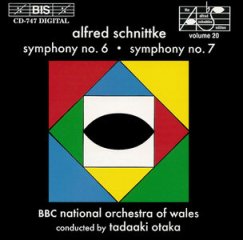Schnittke – Symphonies Nos 6 and 7 (Otaka) [1995]
Schnittke – Symphonies Nos 6 and 7 (Otaka) [1995]

1 Symphony No. 6: Allegro moderato 2 Symphony No. 6: Presto 3 Symphony No. 6: Adagio 4 Symphony No. 6: Allegro vivace 5 Symphony No. 7: Andante 6 Symphony No. 7: Largo 7 Symphony No. 7: Allegro Michael Wright (Double Bass), Nigel Seaman (Tuba), David Buckland (Contrabassoon), David Nolan (Violin) BBC National Orchestra of Wales Tadaaki Otaka – conductor
This issue fills the last gap in the discography of Schnittke's symphonies, and I salute the enterprise of all concerned. Butt have to say that the BBC National Orchestra of Wales could hardly have taken on a tougher assignment.
Rostropovich and his National Orchestra of Washington gave the première of the Sixth Symphony in September 1993, in an open-air concert in Red Square which turned into a demonstration in support of Boris Yeltsin (an event not mentioned in the otherwise exceptionally helpful bookletessay by Ronald Weitzmann). The audience was thoroughly bemused on that occasion, and it's not difficult to see why.
The symphony begins promisingly with an outraged chordal explosion reminiscent of the blackest of Schnittke's black moods. Immediately, however, it splinters into disconsolate fragments which then continue to trot across the score like some once-powerful machine now running on the last dregs of a fiat battery. And so it goes on, and on, through a desultory re-run of the four-movement symphonic scheme. No polystylistic shenanigans, no collisions, visions, or out-of-body experiences, of the kind that make so much of Schnittke's output so memorable and distinctive.
Something of the old magic returns at the end of the three-movement Seventh Symphony of 1993. Here Schnittke finally assembles a haunting melody out of the shattered fragments of a oncemeaningful language, placing it in sepulchral solos for double-bassoon, tuba and double-bass, rather as Mahler does in the slow movement of his First Symphony. This encourages us to go back and try to make sense of the rest-which is still a tall order. Schnittke does not merely "feel the air of another planet", as Schoenberg did when he plunged into atonality, he actually talks its language. All credit to Tadaaki Otaka and the BBC orchestra for sticking to the problematic task of deciphering and communicating these cryptic messages. ---DJF, gramophone.net
download: uploaded yandex 4shared divshare mediafire solidfiles mega zalivalka filecloudio anonfiles oboom
Zmieniony (Piątek, 25 Kwiecień 2014 15:35)
